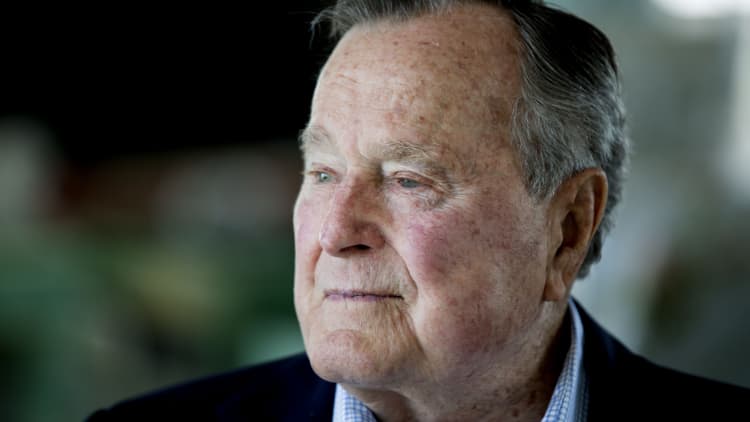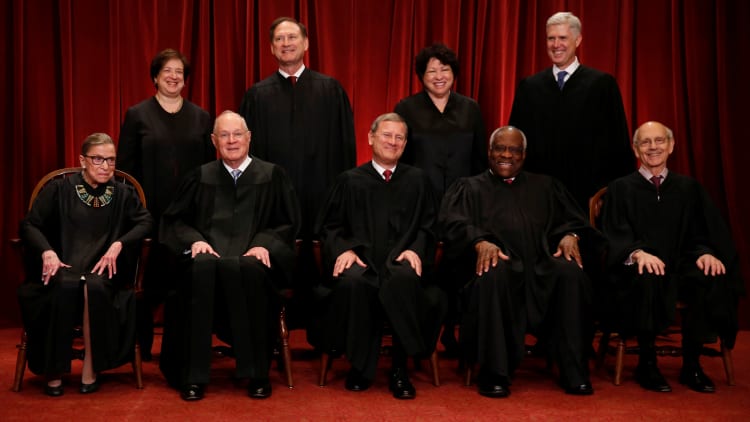
In his single term in the Oval Office, George H.W. Bush presided over the end of the Cold War and liberalized international trade, signing the North American Free Trade Agreement.
But Bush, who died Friday at 94, may have left his most enduring legacy on the Supreme Court, where he nominated two justices and paved the way for two more.
His first nominee was David Souter, who retired from the court in 2009. Souter surprised the country shortly into his tenure by siding with the court's liberals, inspiring a conservative rallying cry — "No more Souters!" — that continues to shape the nomination process to this day.
Justice Clarence Thomas, Bush's second nominee, is the longest-serving justice on the court and its most ardent conservative. The court's most prolific author, Thomas has molded a generation of conservative legal scholarship. His former clerks hold top jobs in the Trump administration.

The court often proves to be where presidents leave their most lasting mark. That appears to be the case with Bush.
In the 25 years since he left office, the end of the Cold War gave rise to new tensions with Russia. NAFTA is on the chopping block, as protectionism gains steam. But Thomas remains on the court, and Souter's legacy has all but ensured there will never be another justice like him.
Bush's selection of two justices who proved to have widely divergent judicial philosophies was made possible by the political moment in which he was president, as well as his own temperament, said Carl Tobias, a law professor at the University of Richmond School of Law and an expert in federal judicial selection.
"I think that the partisanship, the Federalist Society influence that we see pervading everything now, just wasn't that strong at the time," Tobias said. "It was such a different world then, which he personified."
In addition to his Supreme Court nominees, Bush also appointed two future justices to the federal bench: Justice Samuel Alito to the 3rd U.S. Circuit Court of Appeals and Justice Sonia Sotomayor to a U.S. District Court in New York.
He also appointed John Roberts to the U.S. Court of Appeals for the D.C. Circuit, although Roberts was not confirmed. Bush's son President George W. Bush later tapped Roberts to the position before nominating him chief justice, a positions he continues to hold.
The quality of his federal appointments, in contrast to the "mad rush to have so many people confirmed and pack the courts," represent an under-rated aspect of Bush's legacy, Tobias said.
'No more Souters'
Bush tapped Souter to the high court in 1990. The judge, lacking a paper trail, sailed through his Senate confirmation process with 90 votes. He had only been on the federal bench for two months when Bush appointed him.
At the time, the fact that he was largely unknown was seen as an advantage, particularly following President Ronald Reagan's botched attempt to confirm Robert Bork in 1987. Souter was the first person described as a "stealth nominee," said Willy Jay, a partner at the law firm Goodwin Procter and a former clerk for Justice Antonin Scalia, who died in 2016.
However, Souter soon disappointed conservatives with his rulings.
In Planned Parenthood v. Casey, a 1992 case, Souter joined an opinion that surprised and delighted liberals by maintaining the central holdings of Roe v. Wade, the landmark abortion ruling. Years later, he was in the minority in Bush v. Gore, which ended the 2000 Florida recount, assuring the younger Bush's presidency.
Conservatives, most prominently those associated with the influential Federalist Society, vowed after Souter to never let a Supreme Court nominee go to waste. Trump's nominees have come from heavily vetted lists of conservative judges.
In the decades following Souter's confirmation, the politicization of the court has increased. Each subsequent president has placed two justices on the court, and so far, there has not been another ideological surprise.
"I think that it is less likely that someone appointed by a president of either party is going to be a complete surprise philosophically," Jay said. But, he added, judicial philosophies don't always line up neatly with political ideology.
Jay noted that one of Souter's most important legacies was his decision to retire in 2009, at just 69 years old. Souter famously disliked Washington, but his retirement also opened up the door for President Barack Obama to name a liberal to the court. He named Sotomayor.
'High-tech lynching'
Thomas arrived at the court with more fanfare but not much more of a paper trail than Souter. Bush plucked Thomas from the D.C. Circuit Court of Appeals, where he had appointed him less than two years earlier.
The former Reagan administration official's confirmation process was dogged by controversy after one of his former staffers, Anita Hill, accused him of sexual harassment. Thomas denied the allegations and slammed the confirmation process.
"As a black American, as far as I'm concerned it is a high-tech lynching for uppity blacks who in any way deign to think for themselves, to do for themselves, to have different ideas," Thomas said. The process echoed in the contentious confirmation of Justice Brett Kavanaugh earlier this year.
While on the court, Thomas has served as a prolific dissenter, expressing his originalist views of the law in opinions often joined by none of his fellow justices. Those opinions haven't always created Supreme Court precedent, but they have been influential in lower courts and in shaping conservative legal thought.
On the court, his greatest impact has been his willingness to do away with precedent, said Marisa Maleck, who clerked for Thomas in the 2015 term and is now a senior associate at the law firm King & Spalding.
"He says, if we got it wrong, I don't really care, we shouldn't keep getting it wrong and compounding the error," Maleck said.
Thomas' influence also extends to the executive branch. An unusually large number of his former clerks serve in the Trump administration, according to an analysis by The Associated Press. Maleck suggested that could be because of the prominent role members of the Federalist Society have played in assisting the president in staffing.
"There is a natural overlap, the small inner circle," Maleck said.
The list of former Thomas clerks in the Trump administration includes officials in influential posts such as Neomi Rao, who oversees the administration's efforts to pare back regulation. Trump recently nominated Rao to replace Kavanaugh on the D.C. Circuit Court.
The full measure of Thomas's legacy on the court is hard to judge while he remains on the bench. But Thomas is "closer to galvanizing majorities and being in majorities than he ever has been, and so maybe that gives us a sense," according to Richmond University's Tobias.
The legacy could instantly grow should the 70-year-old Thomas retire before 2020. There is some speculation that he could do so in order to assure Trump gets to select his replacement.
"I don't know if he wants to serve another eight years, but he might," Tobias said. "It's hard to imagine him sitting at home and playing pingpong."


